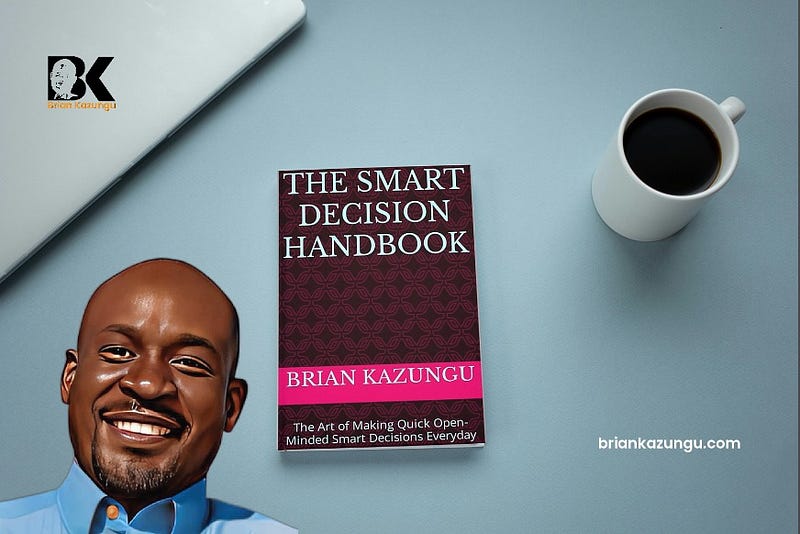Leadership
The Smart Decision Challenge: Let Me Help You To Help Yourself In Making Better Decisions
Published
1 month agoon

I know that making a decision can be quite a challenge and making the right decision can be a nightmare.
As such, I am going to list ten (10) questions below, and I would like you to be honest with yourself on how many of these issues do you find most challenging.
1) Do you struggle with, or do you find it difficult to make quality decisions in your private space or at work?
2) Do you make emotional, random, whimsical decisions which you somehow continuously change abruptly to your own inconvenience and at the expense of others?
3) Do you find it easy to make a decision, and yet difficult to act on it?
4) Do you often make serious strategic decisions and yet always find them to be not good enough thus wasting time, energy, and resources?
5) Do you find it difficult to make a work-life balanced decision and thus finding yourself in strained relationships at work and at home?
6) Do you know how to cope with the consequences of a bad decision which you made for yourself or on behalf of others?
7) Do you find it easy to make personal decisions and yet difficult to make a decision on behalf of others e.g. family or workforce?
8) Do you find it difficult to communicate and relate with people outside your “league”, i.e. race, gender, profession, background etc.?
9) Do you believe that you are materially accomplished and yet still feel empty inside your soul and that anxiousness is now affecting your decision-making abilities?
10) Do you believe you have smart ideas that you feel like they are being resisted left, right and center be it at work or at home?
If you found yourself struggling with any of the above, I would like to let you know that your mind can be trained to easily deal with these challenges using various techniques including the Smart Decision Toolkit which has helped me and many others over the years.

The Smart Decision Toolkit uses the Fundamental Congruence Checklist which is basically a set of ten questions that helps you to process information about a certain subject in order for you to understand it better.
A Fundamental Congruence Checklist seeks to answer critical questions that are important for analysing information towards making informed decisions and taking the right action.
It is a multi-versatile decision-making tool that can be used to gauge the relevance, effectiveness, and impact of anything in life through answering the following ten questions:
1) What is this thing? Who is this person?
2) What does he/she/it do and how? — What are the key result areas or objectives and how are they accomplished?
3) Why does he/she/it do so? — Why are those the key result areas, objective, or purpose?
4) What happens if he/she/it does do not anything or does not perform as expected?
5) Where is this thing or person situated in the whole matrix — what position does he/she/it occupy?
6) Why is he/she/it situated there? — Why is he/she/it occupying that space?
7) What happens if he/she/it is completely removed, moved somewhere, misplaced or even altered?
8) Who is in charge of him/her/it and why? — Who makes he/she/it work as planned?
9) How is his/her/its effectiveness assessed? — How do I or other people know if he/she/it is effective or not?
10) What happens if he/she/it is effective or not — What are the related consequences?
By using a Congruence Checklist, you will be able to clearly define the purpose of anything and then determine its relevance and interconnectedness to other things which are dear to you in life before you commit your energy, time, and resources to it.
When you don’t ask yourself these ten questions, you are most likely to make impulsive decisions out of emotions (excitement) and do things that are very costly and regrettable.
The ten questions in the Congruence Checklist gives you a broader perspective when you want to make a decision on a certain matter especially on issues which has an effect on your health, time, money and other resources.
The main advantages of this checklist as a decision tool are that the first three questions focus on clarity on the subject matter by shedding light on the definition, purpose and processes associated with whatever you are dealing with.
The focus on these three issues helps with assurance/confidence on the fact that whoever is making a decision is doing so on a subject that he/she clearly understands.
Question Four (4) on the checklist helps the decision maker to be open-minded enough to understand that despite good intentions, some missions fail and thus, the mind should be prepared from the beginning to be accountable for such failures and to also come up with Plan B or even C.
The fifth, sixth and seventh questions on the checklist has a ‘Pareto’ effect in that it deals with essence and relevance as a way of evaluating the worthiness of consideration, adoption, and implementation on any subject matter.
These three questions focus on the assessment of importance. When you answer these questions, you will be able to understand if whatever you are dealing with is really worthy your time, money, energy and resources.
Question Eight (8) seeks to identify a person or group of people who are responsible for the implementation of a certain resolution, and also shows us those individuals that are tasked with the mandate of making sure that everything goes as planned (oversight).
The nineth and tenth question seek to address the issue of effectiveness, results and impact, since resolutions that are adopted without clarity on these issues are very costly in terms of time, energy, money and other resources.
Once all the questions on this checklist are answered and a resolution is passed to act on a certain decision, the relevant authority must then sign what I termed the Smart Decision Report which gives an overview of the details behind the adoption of a certain policy, process, procedure etc.
The Smart Decision Toolkit ensures that people make openminded decisions and take informed action which they are accountable for and thus promotes the adoption and implementation of the best Corporate Governance practices in both the private and public sector.
Those who make decisions without the use of any decision framework or toolkit, whether in their individual capacity or as a group in an organisation tend to act whimsically (emotionally) than logically at the expense of their stakeholders i.e. family, friends, or shareholders.
It is therefore critically important for every individual or organisation to adopt the Smart Decision Toolkit in their quest for efficiency, effectiveness, accountability and best practices in the pursuit of any objective.
Besides the Smart Decision Toolkit, which is well explained in The Smart Decision Handbook, I also wrote other books which helps you to make sound decisions and these books include titles such as Fresh Thinking, Managing Your Gift as well as The Hidden Hand Influence.
All the books mentioned above helps you with open minded thinking which gives you a broader picture of anything that you want to decide on before you take any action that can have negative consequences.
In the book, Fresh Thinking, I highlight important issues that people tend to overlook and yet those issues play an important role in creating better and effective relationships with people that you encounter in the journey of your life.
On the other hand, the principles in the book Managing Your Gift helps you to understand the relevance of your abilities in opening the doors of opportunities and fortune for you in both your private and corporate space.
Managing Your Gift also helps you to be able to be mindful of the need of appreciating and integrating the input of other people’s abilities in your decisions and actions in a way that creates a healthy work and life balance.
In the book, The Hidden Hand Influence, I write about the subtle elements which unconsciously influences your decisions and actions.
The main reason behind The Hidden Hand Influence book is to help you recognise things that secretly influences your other people’s decisions and your own decisions so that you won’t find yourself making un-informed, random, and whimsical decisions at your own expense.
For training and assistance on how to effectively use the Smart Decision Toolkit (Fundamental Congruence Checklist) and other important principles in the other books which I wrote, contact me on — [email protected]
Brian Kazungu is an Author, Poet, Journalist, and Technology Enthusiast. Websites: https://www.briankazungu.com https://muckrack.com/brian-kazungu https://www.amazon.com/author/briankazungu https://www.modernghana.com/author/BrianKazungu Email: [email protected] Social Media - Twitter (X) - @BKazungu - Linkedin - www.linkedin.com/in/briankazungu

You may like
-
U.S.-Africa Trade Desk Secures $56 Million South African Table Grape Deal, Benefiting U.S. Consumers and Boosting U.S.-Africa Trade
-


Southern Africa Conference 2024: Bridging Fresh Produce Markets
-
Naspers Limited Announces Annual Results for the Year Ended 31 March 2024
-
Surprise Junior Ngwenya Stuns at District Competitions with Show-Stopping Dance Performance
-


Allegedly: Mike Chimombe and Moses Mpofu Arrested Upon Arrival in Zimbabwe
-
NUST Students to Tackle Accommodation Crisis with Innovative Property Venture






Warning: Undefined variable $user_ID in /home/iniafrica/public_html/wp-content/themes/zox-news/comments.php on line 49
You must be logged in to post a comment Login